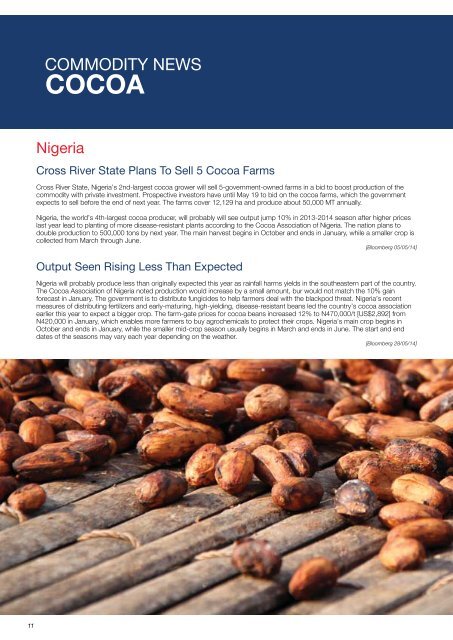You also want an ePaper? Increase the reach of your titles
YUMPU automatically turns print PDFs into web optimized ePapers that Google loves.
COMMODITY NEWS<br />
COCOA<br />
Nigeria<br />
Cross River State Plans To Sell 5 Cocoa Farms<br />
Cross River State, Nigeria’s 2nd-largest cocoa grower will sell 5-government-owned farms in a bid to boost production of the<br />
commodity with private investment. Prospective investors have until May 19 to bid on the cocoa farms, which the government<br />
expects to sell before the end of next year. The farms cover 12,129 ha and produce about 50,000 MT annually.<br />
Nigeria, the world’s 4th-largest cocoa producer, will probably will see output jump 10% in 2013-<strong>2014</strong> season after higher prices<br />
last year lead to planting of more disease-resistant plants according to the Cocoa Association of Nigeria. The nation plans to<br />
double production to 500,000 tons by next year. The main harvest begins in October and ends in January, while a smaller crop is<br />
collected from March through <strong>June</strong>.<br />
[Bloomberg 05/05/14]<br />
Output Seen Rising Less Than Expected<br />
Nigeria will probably produce less than originally expected this year as rainfall harms yields in the southeastern part of the country.<br />
The Cocoa Association of Nigeria noted production would increase by a small amount, bur would not match the 10% gain<br />
forecast in January. The government is to distribute fungicides to help farmers deal with the blackpod threat. Nigeria’s recent<br />
measures of distributing fertilizers and early-maturing, high-yielding, disease-resistant beans led the country’s cocoa association<br />
earlier this year to expect a bigger crop. The farm-gate prices for cocoa beans increased 12% to N470,000/t [US$2,892] from<br />
N420,000 in January, which enables more farmers to buy agrochemicals to protect their crops. Nigeria’s main crop begins in<br />
October and ends in January, while the smaller mid-crop season usually begins in March and ends in <strong>June</strong>. The start and end<br />
dates of the seasons may vary each year depending on the weather.<br />
[Bloomberg 28/05/14]<br />
11


